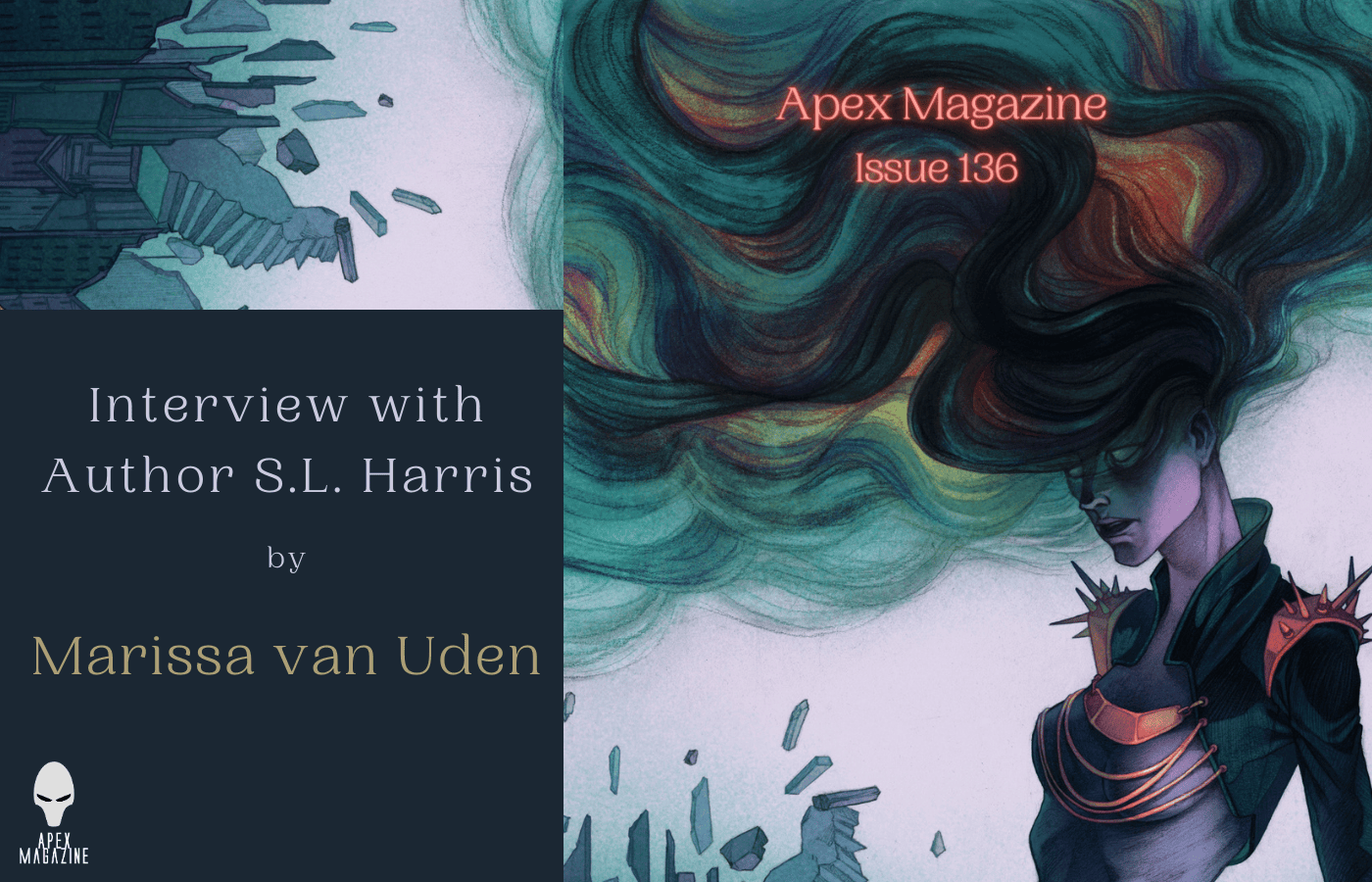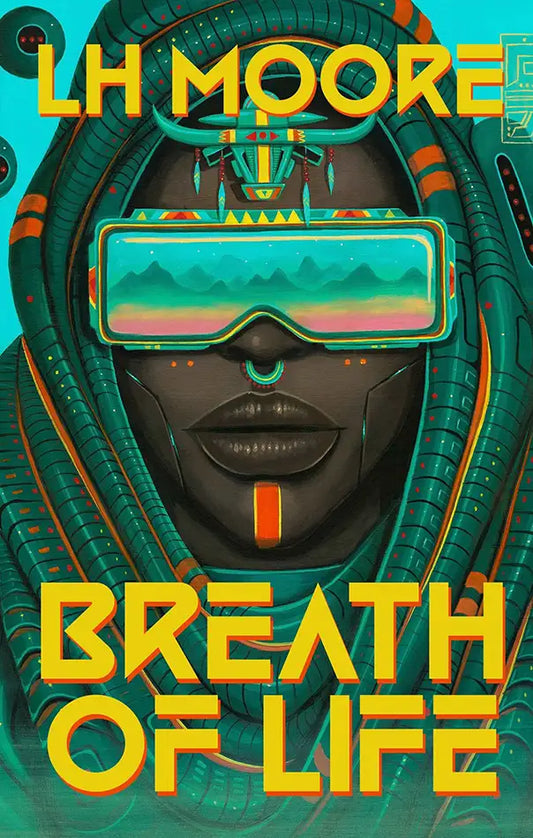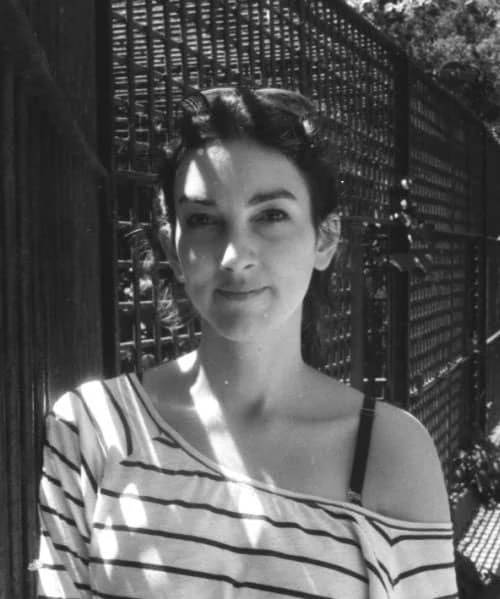
“The Words That Make Us Fly” by S.L. Harris is a story that breaks your heart and then puts it together again. It’s about what happens when your friends and mentors disappear, for a range of different reasons, and who you are without them. It’s also about the power of words, and how they can change and reshape the world around us, and even ourselves.
S.L. Harris is a writer, teacher, and archaeologist who can often be found digging in gardens, libraries, tea cabinets, and ancient houses. Originally from West Virginia, he currently lives in the Midwest with his wife, two children, and many books.
Marissa van Uden: I’m so looking forward to finding out more about this story. Can you tell us how the story first came into being? What was the initial seed of an idea, and how did it develop from there?
S.L. Harris: I was driving through Gary, Indiana and watching stopped trains stretching on into the distance, thinking about how it was that some of cars—and the tags on them—might end up anywhere in the continent or beyond. Then I had a sudden memory of my elementary school in West Virginia, watching trains go by with friends at recess. All that got me thinking about words, friends, the feelings of stuck-ness that can settle in on you in a place, especially when you’re young, and what might happen if you started thinking about words, friends, and magic alike being scattered. That’s where it started, and once the characters started to take shape, the story took shape around them. Hebru Brantley’s “Flyboy” character wasn’t consciously in my mind at all, but in retrospect I have to imagine there was an echo in there somewhere.
MVU: From the very opening paragraph, Prentiss is experiencing a loss that few are prepared for: his usual support system of friends and mentors is no longer available to him, for a variety of reasons. This leaves him feeling trapped and unsure of who he is and how to grow. Did Prentiss need to lose that support structure for a little while to be able to find his own way and absorb what was out there in the world?
SLH: I think that’s right. Prentiss is so used to seeing himself as the sort of hanger-on or also-ran in this group of wordsmiths, and when that group is shattered, he has to take stock not only of who he is, but also of what these relationships have really meant to him, how he can draw strength and magic from these friends and mentors, even those who have gone, and in some ways find himself as a new kind of hub or center.
MVU: The magic in this story comes from words—“Words of making and unmaking, joining and separating, changing and preserving, calling and sending.” For the King, all words are magic, whether they are treatises or diary entries, or delivery menus, receipts, and words written on a pizza box. As a writer, teacher, and archeologist, how much of the King’s perspective do you relate to? What do words mean you to personally, and was there a time in your life when you started to see them differently?
SLH: Words are magic! I’m very much with the Wizard King on this. I was a bookish kid and always had that point of view, but time has only enhanced this sense of words, language, and stories as a principal way—not the only way, but a major way—for us to reach outside ourselves and to understand ourselves. Certainly I feel this as a teacher and writer, and language and narrative have come to be ever more central to my philosophical understanding of the world.
MVU: What was your favorite scene to write in this story and why?
SLH: It’s those two connected scenes of Prentiss learning to fly and then sending the words off on the train cars. I don’t know if there’s a universal human dream, but to be able to fly and leave not just the ground but all the troubles and self-doubts and pain behind is I think a very powerful want—and then, crucially, coming back into the world and realizing yourself a part of it. As I said, that scene of the words going off on the train cars was an image I was writing toward from the beginning.
MVU: Do you have any particular rituals that are part of your writing process? Any routines you have to do?
SLH: I’m someone who works well with discipline and routine and also has a hard time adhering to those routines; I tend to commit myself to writing for a time, and not so much to a number of words. Mornings work well for me, tea is a welcome companion, but in reality, I try just to take the opportunities I get and make the best of them.
MVU: What’s the best piece of writing advice you’ve ever been given?
SLH: This is not by any means original, but one of the best pieces of advice I’ve received is the simple dictum to respect the reader, which I take to mean believing the reader to be as fully human and complex as I am, with life experience, ideas, and perspectives that are different—maybe very different—but no less rich than my own, and (here’s the magic of words) that a story can make a connection between these two different human universes. This makes me see my job as a writer as opening a kind of door to the world, but not to try to lead the reader by the nose or assume that mine is the only way to think about the story I’m telling.
MVU: If we were to find you in your ideal reading place reading one of your favorite books, where would you be and what are you reading?
SLH: That’s a great question. Nowadays, it’s probably in a big chair with my kids, reading aloud together a book that I loved as a kid—The Hobbit, say, or Charlotte’s Web—or something entirely new to me. Or you might find me in a sunny spot, indoors or out … I tend to read widely, so I’m as likely to have some old fantasy of the William Morris/Lord Dunsany stripe as I am to have a work of history or anthropology, a Graham Greene novel, or a new book by Catherynne Valente or Cormac McCarthy.
MVU: For readers who loved this work, where else can they find your stories? And what are you working on at the moment—any interesting projects in the works?
SLH: My flash fiction piece “Secondhand” has just appeared in the March 2023 issue of Fantasy Magazine, and folks interested in my other work can find it in places like Strange Horizons and Daily Science Fiction. I have lots more stories in the hopper, and a novel making the rounds; I hope to have at least some of those words rolling out into the world soon as well.
MVU: Thanks so much for taking the time to answer these questions for us! I’m looking forward to reading more of your work.









